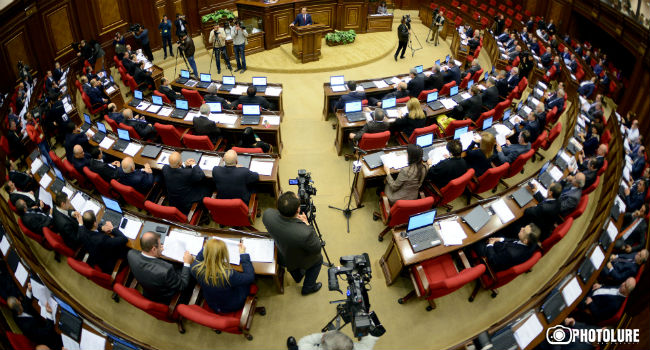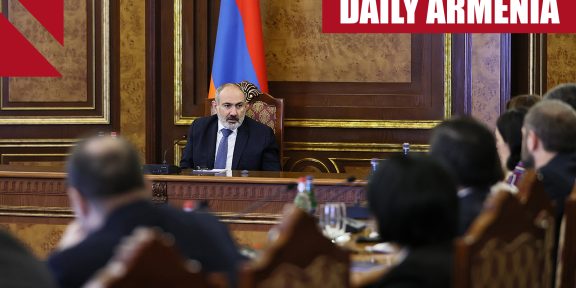 The Armenian National Assembly’s four-day session this week approved the new government’s 2014-2017 program. Only the Republican Party of Armenia faction in parliament voted in favor of the new program. The remaining five parliamentary factions in the National Assembly refused to participate in the vote. Prime Minister Hovik Abrahamyan, said that the government’s program was realistic, rigorous and inclusive.
The Armenian National Assembly’s four-day session this week approved the new government’s 2014-2017 program. Only the Republican Party of Armenia faction in parliament voted in favor of the new program. The remaining five parliamentary factions in the National Assembly refused to participate in the vote. Prime Minister Hovik Abrahamyan, said that the government’s program was realistic, rigorous and inclusive.
The new government was formed on April 3 after former Prime Minister Tigran Sargsyan unexpectedly submitted his resignation.
Among the many criticisms leveled against the government’s new program, some opposition members also criticized governmental appointments, noting that the prime minister and majority of ministers were, in fact, businessmen. Member of Parliament for the Armenian National Congress faction Nikol Pashinyan directed a question to Prime Minister Hovik Abrahamyan regarding the financial disclosure statements by state officials, which they are obligated to submit. Alluding to Finance Minister Gagik Khachatryan, Chief of Staff Minister Davit Harutyunyan and the prime minister himself, Pashinyan asked, “If you are not involved in business, how did you earn all that money?” In response to Pashinyan’s question, Prime Minister Abrahamyan said that the latter should not react negatively to entrepreneurship. “It is thanks to businesspeople that you are sitting here today and receiving your salary; it is thanks to taxes paid by businessmen that we are increasing pensions, increasing salaries; it is through tax remittances that we renovated this beautiful hall in the National Assembly.”
Also this week, the National Assembly elected Arthur Javadyan as the president of Armenia’s Central Bank. President Serzh Sargsyan had proposed Javadyan’s candidacy for that position. Javadyan has held this office for the past six years.
The opposition Armenian Revolutionary Federation faction tabled a proposal to hold special parliamentary hearings to look into the possibility of amending the current legislation so that the 131 members of parliament would be elected only by party lists. Under the current legislation, 41 seats are elected from single-mandate constituencies. Leader of the ARF faction Armen Rustamyan noted that the 41 majoritarian seats in parliament have been used by ruling forces to ensure a majority voice and as a means of sustaining their grip on power. The ARF proposal was defeated after the Republican Party faction voted against the initiative.
The National Assembly passed a decision to make amendments to the decision to create a special parliamentary commission to study the natural gas delivery system in the country. Until that decision was approved, the special commission was composed of 10 members, four from the Republican Party, two from Prosperous Armenia Party and one each from the remaining factions. After the Rule of Law party decided to leave the ruling coalition and moved to the opposition ranks, the balance between ruling and opposition members in the committee was breached. According to the new amendments, Republican Party members will be increased to six in the special commission.
Next week, parliamentary committees of the National Assembly are tasked with assessing the 2013 budget performance report. The next four-day session of parliament is scheduled the week of June 9.
















